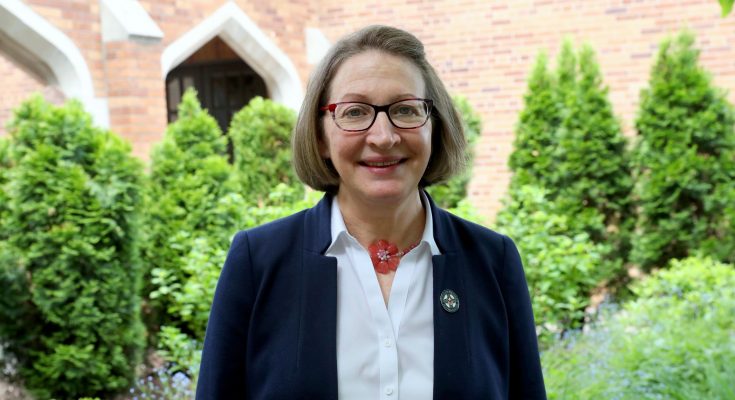The role of women in top management and leadership positions has evolved. Today, women leaders have become rock stars, especially in areas of business, education, and entrepreneurship — a vital part of the economy. Here, Kathleen Getz, Ph.D., the 13th president of Mercyhurst University in Erie, Pennsylvania, explains what leadership means to her and the importance of empowering women to pursue leadership opportunities in their respective fields. Getz will be the featured speaker at the MBA’s Women in Leadership IMPACT Luncheon on March 23 in Erie. Visit mbausa.org to learn more.
As Mercyhurst University’s 13th president, you play a critical role in the University’s overall operations and furthering its mission. Describe your goals and what you want to achieve.
As we approach our Centennial in 2026, it calls to mind the incredible journey that brought us to this point in time. My goal is to prepare us for next 100 years. We have niche programs that have earned global reputations. We intend to strengthen and expand Intelligence Studies, our Autism Initiative, and our role as a center of excellence in arts and culture. At the same time, we are building programs in sustainability studies, in wellness, and in diversity, equity, inclusion and justice, all of which are consistent with our mission as a Mercy institution.
In many ways, a university president is always a leader first. How would you describe your approach to leadership?
I like to think I combine visionary leadership with collaboration, encouragement and openness to participation. I am not an autocratic leader, although I’m not afraid to stand alone and make the tough calls when necessary. My approach is more along the lines of transformational leadership and habits rooted in emotional intelligence. These so-called soft skills can be vital to running a business or, in my case, a university. Although, keep in mind, being an effective leader isn’t about having one “right” leadership style. Good leaders often adapt their approach based on the situation and the team they’re working with.
In your opinion, what makes a good leader great?
A good leader excels in a variety of traditional leadership skills — integrity, vision, strategic thinking, to name a few. I think a great leader is someone who is self-aware and authentic, who recognizes his or her strengths and his or her weaknesses and works with others to supplement those areas where he or she is less strong. I also think great leaders have a capacity for humility and aren’t afraid to add a little levity to the mix. I consider myself an optimist and, wherever I go, I like to keep this quote by Robert Brault close at hand: “Optimist: Someone who figures that taking a step backward after taking a step forward is not a disaster; it’s a Cha-Cha.” Great leaders know how to Cha-Cha.
Prior to Mercyhurst, you were dean at the Sellinger School of Business and Management at Loyola University Maryland, dean at the Quinlan School of Business at Loyola University Chicago, and senior associate dean for Academic Affairs at the Kogod School of Business at American University. What do you believe is the cornerstone of a great business school — one that will prepare students to thrive in the business world?
It is critical that many people in the school — leaders, faculty and students — be deeply connected with the business community. The purpose of that kind of connection is that the school is constantly aware of what businesses’ needs are and can adapt curricula and experiential learning opportunities accordingly to best serve students and businesses. In addition, the best business programs are built on a foundation of the liberal arts, and deliberately help their students understand how that foundation will make them better business leaders — who think critically, are comfortable with uncertainty, and are willing to take measured risks. This assures that students graduate with the skills, knowledge and character required to thrive in the business world.
While women represent nearly half of today’s workforce, they are vastly underrepresented in leadership positions. What are your thoughts on the importance of encouraging women to pursue leadership opportunities?
I think that as women in leadership, it is incumbent upon us to lift up others. That’s often best achieved through role modeling. We can also mentor, articulate common goals, prioritize personal development, act as sounding boards, all the while building a culture of allyship. I’ve heard it said that when there’s a leadership job opening, a man will apply when he meets just a few of the qualifications, while a woman will apply only when she meets most of them. So, there’s this sense that we need to get women to take greater risks, understanding that some competencies can be mastered on the job.
What is Mercyhurst University’s approach to empowering the next generation of leaders — students, faculty and staff?
I make every effort as president to encourage a wide array of participation in decision-making and, as that filters out to other levels of the institution, more people’s voices are heard. As well, I try to practice subsidiarity — assuring those closest to a problem make decisions. In this way, decisions are made more quickly and people become self-confident. This quote from Eleanor Roosevelt applies: “A good leader inspires people to have confidence in the leader; a great leader inspires people to have confidence in themselves.”















